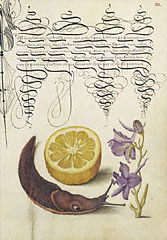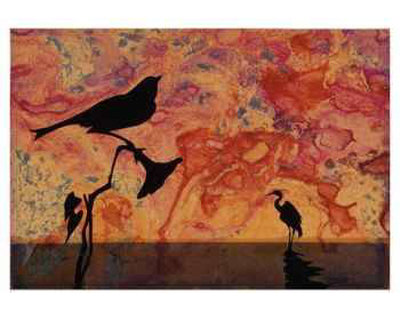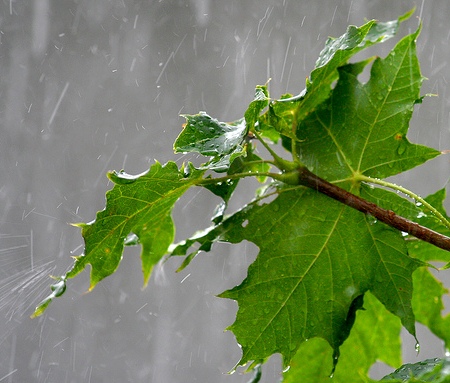"Anger as soon as fed is dead- / 'Tis starving makes it fat."
--Emily Dickinson
Ignoring the red zone does make things worse and could lead to explosion, but even Mother Earth needs to explode now and then.
Anyway, few nights ago I came across that couplet and mentally bookmarked it. It reminded me of my poem, not published, "Distance in Nature."
I was syllable counting at the time I write "Distance," which seems a perfect approach for a description of an emotion so baffling (sometimes) we work to contain it. Unexpressed love is sad. Unexpressed anger is, huh, sad, too, but I was going to say, fearsome and controlling.
(By the way, the Easter scene, those eggs with the tiny tableaux, like ships in bottles--not sure they are still around.)
Distance in Nature
Fitted glass seals the shell.
Hissing sand, mollusks, trapped.
Great wonder? Bare feet best.
This separateness not good:
No Easter scene in egg.
A shell is bad enough.
Great anger? Estrangement
From compassion. Distance
In nature, swept away.
_______________________
Sarah Sarai
Tuesday, August 23, 2011
Sunday, August 21, 2011
Amy Clampitt & Homer’s gibbering Thespesiae iache
I have Amy Clampitt beat by three years. She published her first poetry collection at 63, whereas I was a mere lass of 60 when The Future Is Happy emerged from the womb of BlazeVOX [books].
There comparisons dissolve but they are odious anyway as we all know and mean nothing unless one is writing an essay comparing and contrasting the rise and fall of the Roman Empire with the rise and fall of hula hoops. Then comparisons are pretty cool.
And speaking of beautiful which we weren't but it's time we did, here is one of Amy Climpitt's poems. She's right. "Syntax comes last, there can be / no doubt of it. . ."
Syrinx
Like the foghorn that’s all lung,
the wind chime that’s all percussion,
like the wind itself, that’s merely air
in a terrible fret, without so much
as a finger to articulate
what ails it, the aeolian
syrinx, that reed
in the throat of a bird,
when it comes to the shaping of
what we call consonants, is
too imprecise for consensus
about what it even seems to
be saying: is it o-ka-lee
or con-ka-ree, is it really jug jug,
is it cuckoo for that matter?—
much less whether a bird’s call
means anything in
particular, or at all.
Syntax comes last, there can be
no doubt of it: came last,
can be thought of (is
thought of by some) as a
higher form of expression:
is, in extremity, first to
be jettisoned: as the diva
onstage, all soaring
pectoral breathwork,
takes off, pure vowel
breaking free of the dry,
the merely fricative
husk of the particular, rises
past saying anything, any
more than the wind in
the trees, waves breaking,
or Homer’s gibbering
Thespesiae iache:
those last-chance vestiges
above the threshold, the all-
but dispossessed of breath.
Amy Camplitt, 1920-1994
Illustration by John Ezra Keats
There comparisons dissolve but they are odious anyway as we all know and mean nothing unless one is writing an essay comparing and contrasting the rise and fall of the Roman Empire with the rise and fall of hula hoops. Then comparisons are pretty cool.
And speaking of beautiful which we weren't but it's time we did, here is one of Amy Climpitt's poems. She's right. "Syntax comes last, there can be / no doubt of it. . ."
Syrinx
Like the foghorn that’s all lung,
the wind chime that’s all percussion,
like the wind itself, that’s merely air
in a terrible fret, without so much
as a finger to articulate
what ails it, the aeolian
syrinx, that reed
in the throat of a bird,
when it comes to the shaping of
what we call consonants, is
too imprecise for consensus
about what it even seems to
be saying: is it o-ka-lee
or con-ka-ree, is it really jug jug,
is it cuckoo for that matter?—
much less whether a bird’s call
means anything in
particular, or at all.
Syntax comes last, there can be
no doubt of it: came last,
can be thought of (is
thought of by some) as a
higher form of expression:
is, in extremity, first to
be jettisoned: as the diva
onstage, all soaring
pectoral breathwork,
takes off, pure vowel
breaking free of the dry,
the merely fricative
husk of the particular, rises
past saying anything, any
more than the wind in
the trees, waves breaking,
or Homer’s gibbering
Thespesiae iache:
those last-chance vestiges
above the threshold, the all-
but dispossessed of breath.
Amy Camplitt, 1920-1994
Illustration by John Ezra Keats
Wednesday, August 3, 2011
Like Earth we're "beatified now by a thing / borne in the dust"
Everything is what it is but fortunately for artists, the opposite is equally true. Nothing is what it is or everything is a bit of this and that and nothing contains multitudes same as everything; or it doesn't.
What am I even talking about?
A poem. The "Garden of Sex" by Jeanne Larsen. It's from Why We Make Gardens, which I reviewed for The Rumpus earlier this year.
Here the earth is a sweet lover, the skin has "windowed leaves" and surrender is a thing, a being, a presence. It's wise, surrender, in knowing "it too will be fed."
The Garden of Sex
This earth is sown
with salt. And it blossoms
wholly, beatified now by a thing
borne in the dust, undeniable,
tender. Its stark
rain still intimates.
It soothes and insists
that it never will stop. Why,
of course this ground trembles,
relentless. This wild garden grips
the stem of the brain. It
yields up the soft
blood's opaque, wet, spent
fruits. It looks out
past your skin's windowed
leaves. At the downpour’s
warm eye, this breathing terrain
simply swells. Rhizomes spread out,
eager and curiously calm.
What holds them's no more
than surrender that knows
it too will be fed.
--------------------------------------------------------------------------------
Jeanne Larsen, Why We Make Gardens (Other Other Poems), Mayapple Press, 2011.
What am I even talking about?
A poem. The "Garden of Sex" by Jeanne Larsen. It's from Why We Make Gardens, which I reviewed for The Rumpus earlier this year.
Here the earth is a sweet lover, the skin has "windowed leaves" and surrender is a thing, a being, a presence. It's wise, surrender, in knowing "it too will be fed."
The Garden of Sex
This earth is sown
with salt. And it blossoms
wholly, beatified now by a thing
borne in the dust, undeniable,
tender. Its stark
rain still intimates.
It soothes and insists
that it never will stop. Why,
of course this ground trembles,
relentless. This wild garden grips
the stem of the brain. It
yields up the soft
blood's opaque, wet, spent
fruits. It looks out
past your skin's windowed
leaves. At the downpour’s
warm eye, this breathing terrain
simply swells. Rhizomes spread out,
eager and curiously calm.
What holds them's no more
than surrender that knows
it too will be fed.
--------------------------------------------------------------------------------
Jeanne Larsen, Why We Make Gardens (Other Other Poems), Mayapple Press, 2011.
Tuesday, August 2, 2011
Why I Used a Pen Name Today
I submitted a short story under a different name today. By different I mean not Sarah Sarai. I used a last name that has meaning to me and instead of a first name, cleverly (hah) used an initial.
The email I submitted through is my back-up email. My name isn't visible though since it has embedded therein a quotation from Emily Dickinson--something that didn't occur to me until I hit "send"--it's not the great ruse to beat all ruses.
I made the choice of using a pen name because this story was just rejected with the comment that although well-written it seemed a bit young adult.
That wasn't intended as an insult or taken as such. I did wonder, however, if the reaction might not have factored in my being a woman. Catcher in the Rye is a bit young adult, but no one (except the fool right-wingers who like to burn books) would reject Catcher.
Brainstorming ways to fool with a false scent, I also changed the protagonist's name from Jennie, which is super girlie, to C.G., which evokes neither Barbies nor high school. (And not in the least bit coincidentally, use C.G. as a prefix to Jung and you have C.G. Jung, who collected the unconscious and then regifted it to all of us.)
The protagonist name change is a good idea in general. It improves the story. Whether or not changing my name to a more gender ambiguous initial plus a last name will have an effect on getting published, I can't be sure. My poetry gets accepted enough I don't let my mind wander to the number of rejections I might get because I am a woman.
My fiction, however, has such a distinctly and surprisingly, to me, female voice, it is at risk of dying of neglect. With Vida publicizing the discrepancies in number of women versus men who get published, I can feel at least a little assured this feeling of annoyance is not sour grapes on my part.
We'll see.
The email I submitted through is my back-up email. My name isn't visible though since it has embedded therein a quotation from Emily Dickinson--something that didn't occur to me until I hit "send"--it's not the great ruse to beat all ruses.
I made the choice of using a pen name because this story was just rejected with the comment that although well-written it seemed a bit young adult.
That wasn't intended as an insult or taken as such. I did wonder, however, if the reaction might not have factored in my being a woman. Catcher in the Rye is a bit young adult, but no one (except the fool right-wingers who like to burn books) would reject Catcher.
Brainstorming ways to fool with a false scent, I also changed the protagonist's name from Jennie, which is super girlie, to C.G., which evokes neither Barbies nor high school. (And not in the least bit coincidentally, use C.G. as a prefix to Jung and you have C.G. Jung, who collected the unconscious and then regifted it to all of us.)
The protagonist name change is a good idea in general. It improves the story. Whether or not changing my name to a more gender ambiguous initial plus a last name will have an effect on getting published, I can't be sure. My poetry gets accepted enough I don't let my mind wander to the number of rejections I might get because I am a woman.
My fiction, however, has such a distinctly and surprisingly, to me, female voice, it is at risk of dying of neglect. With Vida publicizing the discrepancies in number of women versus men who get published, I can feel at least a little assured this feeling of annoyance is not sour grapes on my part.
We'll see.
Subscribe to:
Posts (Atom)



